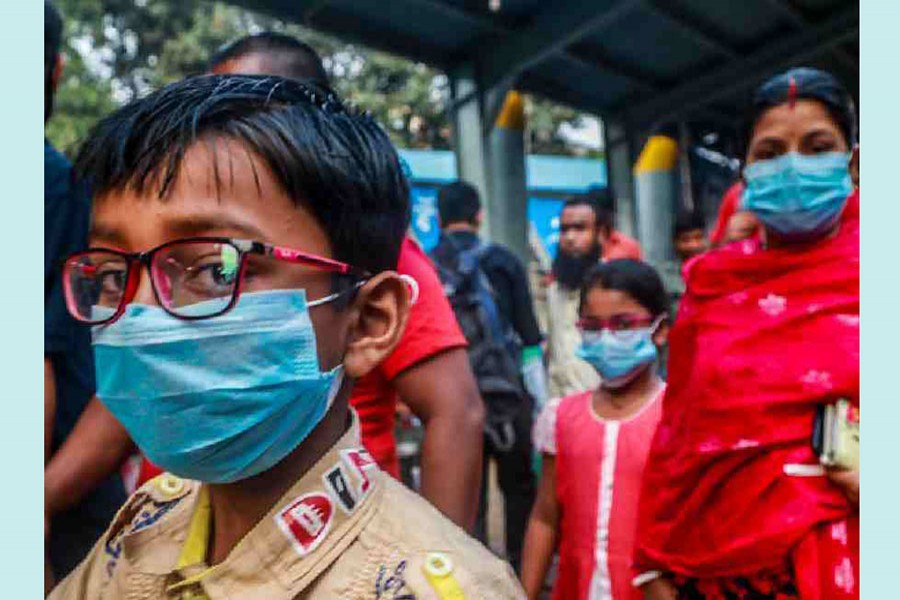Like almost all other sectors, the education sector has also been critically hampered due to the COVID-19 pandemic and the lockdown it brought upon. Schools and colleges across the country are still shut down, considering the vulnerability of the students. But every process has multiple interdependent chains of processes, so the sudden closure of educational institutes eventually resulted in their structural and financial system-crashes. It, somewhat, stayed in the background that our teachers and staff depend mainly on the income of the institutes for their salaries. Hence, when the guardians are not paying tuition fees, they are ultimately jeopardising the livelihood of the respected professionals who have devoted their lives to mentor their beloved children.
This is a scenario that is currently evident in Bangladesh, which includes a growing dispute between English-medium schools and the parents of the students. The parents have been placing demands including tuition fee reduction, and some of them even went to courts and ministries to establish these sorts of demands – all of which will perhaps be subject to a rethinking.
It should not be a genius to understand how the business aspect of school functions. Keeping the primary objective of educating and preparing the youth for a better future in focus, every academy also needs to explore its opportunities to earn money. This money, to state as discreetly as possible, does not go into funding high-risers for tycoons. The institutional income for most schools is spent on the payment of teachers and staff, infrastructural development, and academic welfare funds, which facilitate charitable initiatives and scholarships, besides covering utility bills, training, and such. When the incoming cash flow is halted or obstructed, the functionality of academic processes is bound to face negative consequences.
For years, a prestigious pool of English-medium schools in Bangladesh has been creating leaders for the nation. Hundreds of students are being trained for attaining solid basics by these schools and are made to be scholars who later go on to excel in the most respected professions. Besides academic proficiency, English-medium students are also appraised for their understanding of global culture, etiquette, and compatibility with the world-class higher education institutes. What most parents tend to forget or overlook is the fact that – all good things come at a price. This does not necessarily mean guardians must pay tons of money every month, but at least a visible gratitude is required from them, which will confirm the integrity of the relation between them and the schools. The parents must acknowledge that their children are being trained by the most distinguished set of teachers inside the prime and incomparable campus environments under meritoriously designed curriculum plans - all of which must require a sound expenditure for availability and continuation.
Parents and guardians showing total disregard for the English-medium schools’ sustainability is extremely disheartening for the school authorities. COVID-19 came as a novel virus for the entire population. It requires complete cooperation and collaboration of all to overcome the distress the virus is leaving. In fact, almost all the schools took necessary measures in advance to continue classes via virtual platforms so that students do not have to worry about completing their sessions. When classes continued in full-pace despite an all-succumbing pandemic, why would the guardians hesitate to pay their tuition fees? It needs a logical explanation: when the schools are going beyond their extents to continue the education of their students without any interruption, what reasons could possibly drive certain parents’ forums to take their strange steps of reaching the court, the Directorate General of Higher and Secondary Education (DHSE) office, and even the Ministry of Education, simply to deprive the schools of their rights.
A significant number of parents have already stopped paying their tuition fees. Others are fighting for a reduction of up to 50 per cent tuition-fees. Amidst such an ongoing crisis, the schools are still expected to pay their employees without any disruption because maintaining such a highly skilled employee-base requires unwavering commitment. At this point, any rational reader would have understood the severe dilemma Bangladesh’s English-medium schools are currently going through. Schools are not business organisations; teachers do not sell products. Every educational institute must have a noble impression to confirm that it is a place where perspectives are shaped, and minds are illuminated. If bills of cash become the ultimate determiner of a school’s fate, it may as well tell the nation that it has failed to grasp the purpose of education.
The extravagant claims raised by certain guardians’ forums and groups is surely going to cause a national disaster. With no funds, no school can practically continue to run its courses. We indeed need education to see a better tomorrow, but it is also true that we need food and shelter actually to survive until tomorrow. Taking away tuition-fees from the schools is simply another form of taking away the food and shelter from the school authorities, teachers, and staff. Now it is up to the guardians to decide if they would like to face a seesaw between their children’s future and their money.
The writer is a tech professional and concerned parent.


